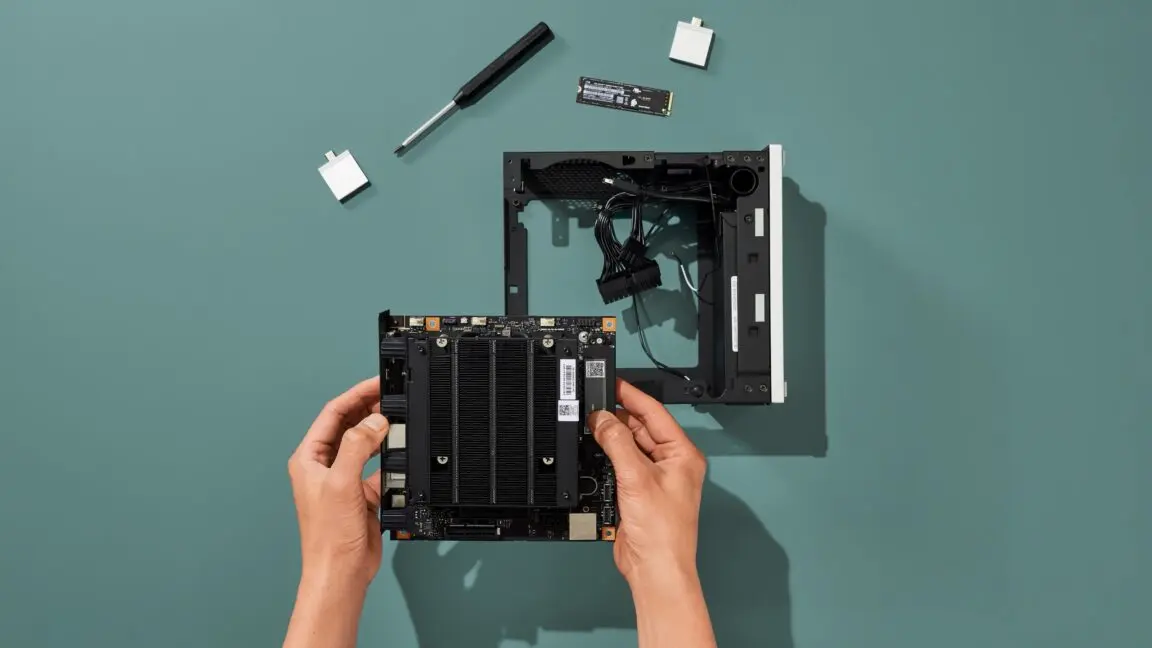- cross-posted to:
- hackernews@lemmy.bestiver.se
- cross-posted to:
- hackernews@lemmy.bestiver.se
“To enable the massive 256GB/s memory bandwidth that Ryzen AI Max delivers, the LPDDR5x is soldered,” writes Framework CEO Nirav Patel in a post about today’s announcements. “We spent months working with AMD to explore ways around this but ultimately determined that it wasn’t technically feasible to land modular memory at high throughput with the 256-bit memory bus. Because the memory is non-upgradeable, we’re being deliberate in making memory pricing more reasonable than you might find with other brands.”
😒🍎
Framework releasing a Mac Mini was certainly not on my bingo card for this year.
I feel like this is a big miss by framework. Maybe I just don’t understand because I already own a Velka 3 that i used happily for years and building small form factor with standard parts seems better than what this is offering. Better as in better performance, aesthetics, space optimization, upgradeability - SFF is not a cheap or easy way to build a computer.
The biggest constraint building in the sub-5 liter format is GPU compatibility because not many manufacturers even make boards in the <180mm length category. Also can’t go much higher than 150-200 watts because cooling is so difficult. There are still options though, i rocked a PNY 1660 super for a long time, and the current most powerful option is a 4060ti. Although upgrades are limited to what manufacturers occasionally produce, it is upgradeable, and it is truly desktop performance.
On the CPU side, you can physically put in whatever CPU you want. The only limitation is that the cooler, alpenfohn black ridge or noctua l9a/l9i, probably won’t have a good time cooling 100+ watts without aggressive undervolting and power limits. 65 watts TDP still gives you a ryzen 7 9700x.
Motherboards have the SFF tax but are high quality in general. Flex ATX PSUs were a bit harder to find 5 or 6 years ago but now the black 600W enhance ENP is readily available from Velkase’s website. Drives and memory are completely standard. m.2 fits with the motherboard, 2.5in SATA also fits in one of the corners. Normal low profile DDR5 is replaceable / upgradeable.
What framework is releasing is more like a laptop board in a ~4 liter case and I really don’t like that in order to upgrade any part of CPU, GPU or memory you have to replace the entire board because it’s soldered on APU and not socketed or discrete components. Framework’s enclosure hasn’t been designed to hold a motherboard+discrete GPU and the board doesn’t have a PCIe slot if you wanted to attach a card via riser in another case. It could be worse but I don’t see this as a good use of development resources.
Lmao the news about this desktop is strangling their website to the point of needing a 45 minute waiting list
Now, can we have a cool European company doing similar stuff? At the rate it’s going I can’t decide whether I shouldn’t buy American because I don’t want to support a fascist country or because I’m afraid the country might crumble so badly that I can’t count on getting service for my device.
Holy moly this is awesome! I am in for the 128GB SKU.
That’s 96GB of usable VRAM! And way more CPU bandwidth than any desktop Zen chip.
I know people are going to complain about non upgradable memory, but you can just replace the board, and in this case it’s so worth it for the speed/power efficiency. This isn’t artificial crippling, it physically has to be soldered, at least until LPCAMM catches on.
My only ask would be a full X16 (or at least a physical X16/electrical x8) PCIe slot or breakout ribbon. X4 would be a bit of a bottleneck for some GPUs/workloads… Does Strix Halo even support that?
I understand the memory constraints but it does feel weird for framework, is all I have to say. But that’s also the general trajectory of computing from what it seems. I really want lpcamm to catch on!
Eventually most system RAM will have to be packaged anyway. Physics dictates that one pays a penalty going over pins and mobo traces, and it gets more severe with every advancement.
It’s possible that external RAM will eventually evolve into a “2nd tier” of system memory, for background processes, spillover, inactive programs/data, things like that.
It’s already fourth tier after L1, L2, L3 caches.
Maybe something like optane will make a comeback. Having 16gb of soldered RAM and 500gb of relatively slow, but inexpensive optane RAM would be great.
Apparently Framework did try to get AMD to use LPCAMM, but it just didn’t work from a signal integrity standpoint at the kind of speeds they need to run the memory at.
Sounds like it doesn’t bode well for the future of DIMMs at all, TBH.
You have a DIMM view of the future.
deleted by creator
What’s a SKU? Google just says “Stock Keeping Unit”, but I don’t think that’s correct in this context.
It’s correct. A product with various options will have each combination of options under a different SKU. It’s a singular number that identifies an exact version of a product.
In this context, SKU refers to a variant of this product. That is the correct acronym as I understand
its used to mean a new product that you specifically have to keep track of. e. g if you found framework desktops in a store, it wouldnt all be sold under 1 sku. all 3 ram capacities would be 3 different bar codes
a new product
not only new
As others said.
In this context it would be one of the CPU/Memory combinations framework offers: https://en.wikipedia.org/wiki/List_of_AMD_Ryzen_processors#Strix_Halo_(Zen_5/RDNA3.5/XDNA2_based)
I really hope this won’t be too expensive. If it’s reasonably affordable i might just get one for my living room.
they already announced pricing for them.
1099 for the base ai max model with 32gb(?), 1999 for fully maxed with the top sku.
With a cheeky comparison to Apples nearly $5k offering.
Bummer
So… now Framework Corp is selling non-upgradable hardware?
I dunno. Conceptually I want to like Framework. But their pricing means it is basically never worth buying and upgrading versus just buying a new laptop (seriously, run the numbers. You basically save 10 bucks over two generations of shopping at Best Buy). But they also have a system that heavily encourages people to horde spare parts rather than just take it to an e-waste disposal facility/bin.
It will be faster than most next-gen laptops, and it’s much cheaper than a similarly-specced Asus Z13. Strix Halo uses a quad channel 8533Mhz bus, 2 full Zen CCDs like you find in desktops/servers, and a 40 CU GPU. Its more than twice the size/performance of two true “laptop chips” put together.
Everything except the APU/RAM/Mobo combo is upgradable, and you don’t have to replace the whole machine if the board fails.
I mean, if you don’t need that kind of compute/RAM, this system is not for you, and old gaming desktops are probably better deals for pure gaming. But this thing has a niche.
Everything except the APU/RAM/Mobo combo is upgradable, and you don’t have to replace the whole machine if the board fails.
So… storage, case, and USB C dongles?
No, the pc is upgradable. They explicitly said in the event that the desktop was suppose to be an actual desktop with replaceable parts as much as technically possible. Only ram is tied to the mobo/cpu because of technical limitations of the amd cpu
At least memory is soldered on because of high throughout they say.
Xbox with the ability to run windows is what the article is basically saying.
Or linux.
This thing makes a whole lot of pricey workstations obsolete.
I think I need to give Linex a try again. I tried ubuntu in 2008 but found it too difficult to do the things I was used to doing on windows. I now have a bit more coding experience and will probably pick it up quicker
You don’t have to pick and choose, you can dual boot.
But the only thing I boot Windows for these days is gaming and Microsoft Teams. Linux has come a long way since 2008.
It’s gotten so much better since 2008. Ubuntu is good for servers, but probably not what you’re looking for on a desktop. And you really don’t need to have a coding background to use it, though it also depends on your use case.









